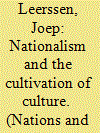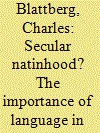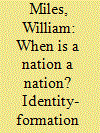| Srl | Item |
| 1 |
ID:
074094


|
|
|
|
|
| Publication |
2006.
|
| Summary/Abstract |
The recent and unresolved conflict in Côte d'Ivoire has received little attention in the English-speaking world. Where it is discussed, the instrumentalist view of ethnic conflict predominates. This is a linear and structural argument. It examines how pre-given ethnic groups gained political voice in clashes over control of economic resources, and were subsequently manipulated by political elites with personal agendas. This paper questions the coherence of group identity and instead emphasises the agency of individuals. It argues that the meaning of ethnic identity was transformed as social and economic grievances led to conflict between political groupings. This approach accords individual Ivoirians more responsibility for determining the boundaries of ethnic and nationalist exclusion, and for participating in the ensuing violent conflict.
|
|
|
|
|
|
|
|
|
|
|
|
|
|
|
|
| 2 |
ID:
074090


|
|
|
|
|
| Publication |
2006.
|
| Summary/Abstract |
On the basis of an extensive sample of European source material, the article investigates the meaning and importance of 'culture' in cultural nationalism. The author argues that European cultural nationalism in the nineteenth century followed a separate dynamic and chronology from political nationalism. Cultural nationalism involved an intense cross-border traffic of ideas and intellectual initiatives, and its participating actors often operated extraterritorially and in multi-national intellectual networks. This means that cultural nationalism needs to be studied on a supranational comparative basis rather than country-by-country, concentrating on the exchange and transfer of ideas and activities. A working model is proposed which may serve to bring these ideas and activities into focus.
|
|
|
|
|
|
|
|
|
|
|
|
|
|
|
|
| 3 |
ID:
074091


|
|
|
|
|
| Publication |
2006.
|
| Summary/Abstract |
The 'Hans Kohn Dichotomy', i.e. the distinction between 'Western' and 'Non-Western' nationalism, remains one of the most persistent paradigms in the study of nationalism. This article deals briefly with the terms of Kohn's Dichotomy and with the discussion about it. The main purpose of the article, however, is to problematise the dichotomy in terms of Kohn's personal itinerary which took him from Prague to Russia, and from Britain and Palestine to the United States. Kohn came late to the view that there were two types of nationalism. He adopted this position in the wake of a series of political and personal disappointments, and in response to dramatic historical challenges. In the final analysis, Kohn's Dichotomy was a rhetorical construct, designed to make sense of a world in conflict and to allow Kohn and others, then and later, to come to terms with the hopes and fears raised by nationalism.
|
|
|
|
|
|
|
|
|
|
|
|
|
|
|
|
| 4 |
ID:
074092


|
|
|
|
|
| Publication |
2006.
|
| Summary/Abstract |
Because of their failure to distinguish enough between interpretation and creation, scholars of nationhood have tended to neglect the role of creativity in both the genesis and persistence of national communities. Giving creativity its due leads us to question the standard conception of nations, and of the states that recognise them, as secular. This, in turn, suggests that we need to interpret the significance that language has for nationalists in a new way. After showing how, the paper concludes with an argument about what this new interpretation should mean for language politics.
|
|
|
|
|
|
|
|
|
|
|
|
|
|
|
|
| 5 |
ID:
074095


|
|
|
|
|
| Publication |
2006.
|
| Summary/Abstract |
Nationhood is usually considered a subjective state of being acquired by a self-conscious group sharing cultural distinctiveness and political goals. Social scientists and historians also endeavor to delineate objective factors that impart national status to minority peoples. Rarely do the elected officials of a non-sovereign people have the opportunity to vote on whether or not their constituency constitutes a discrete nation. The extraordinary Congress of 2002 in Martinique did provide such an opportunity, however. The contradictory outcomes of that seminal event - including the plebiscite one year later on a proposed change of status for this Caribbean island within the French Republic - reveal much about the ambiguous status of Martinican group identity. They also underline the need for theoreticians of nationalism to take into account politically and culturally specific understandings of the very concept of 'nation'. That a formerly colonised people may materially benefit disproportionately from ongoing institutional relationships with its former colonial power - countercolonialism - also needs to be considered.
|
|
|
|
|
|
|
|
|
|
|
|
|
|
|
|